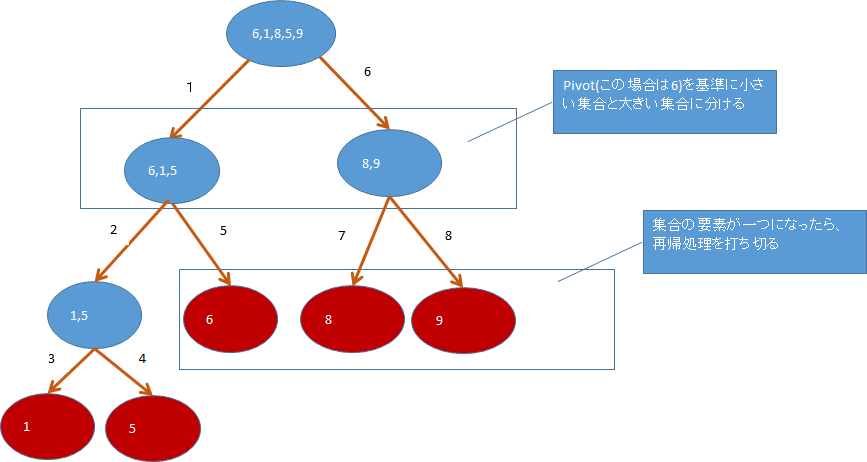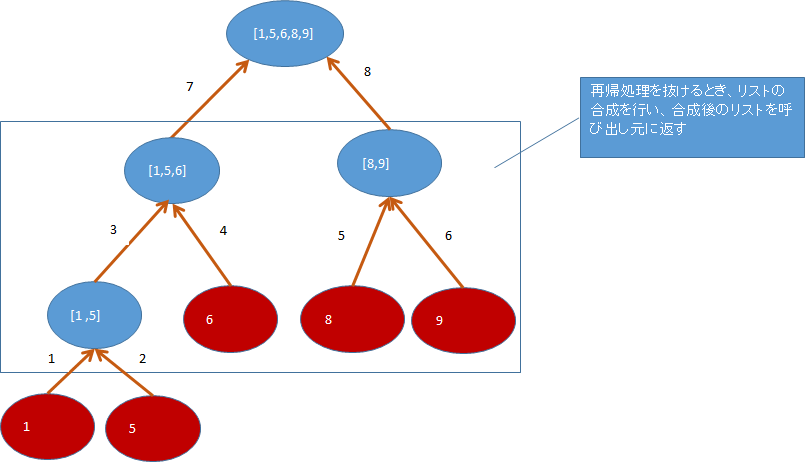The idea of quicksort
At the beginning
Since the implementation of quicksort explained on the net did not come well, I will upload an article that I summarized myself. The algorithm policy adopts element decomposition and reaggregation, which is often taken up in the explanation of functional languages, and I will try to implement it in Java and see how troublesome it is to implement quicksort in imperative languages.
The idea of quicksort
As an example, consider sorting a set of numbers [6,1,8,5,9]. When doing quicksort, we need a criterion to divide the elements, but here we will use the first element of the set as the criterion.
Disassembled image of the list

Image of aggregated list after decomposition

Implementation code
Qsort.java
package test;
import java.util.ArrayDeque;
import java.util.ArrayList;
import java.util.Arrays;
import java.util.Deque;
import java.util.List;
public class QSort {
public static void main(String args[]){
System.out.println(qsort(Arrays.asList(1,5,6,2,11,9,4)));
}
public static List<Integer> qsort(List<Integer>list){
if(list.size()==1){
//If the array contains one element, exit the recursive process
return new ArrayList<Integer>(list) ;
}else{
//Call the process to split the elements in the list
Divive div = splitList(list);
//Generate a list to store the split array
List<Integer>newList = new ArrayList<Integer>();
//Perform recursive processing to separate a small set of numbers again
newList.addAll(qsort(div.leftList));
//Perform recursive processing to isolate a large set again
newList.addAll(qsort(div.rightList));
return newList ;
}
}
//Function to split the list
public static Divive splitList(List<Integer>list){
int size =list.size();
Divive div = new Divive();
//When the number of elements is two, the size of the elements is compared and the elements are divided.
if(size==2){
if(list.get(0)<=list.get(1)){
div.leftList.add(list.get(0)) ;
div.rightList.add(list.get(1)) ;
}else{
div.leftList.add(list.get(1)) ;
div.rightList.add(list.get(0)) ;
}
return div;
}
int pivot = list.get(0);
List<Integer>smallIntList =new ArrayList<Integer>();
List<Integer>largeIntList =new ArrayList<Integer>();
//Divide the list given by the argument into a small set and a large set according to a predetermined criterion.
for(int i=0;i<size;i++){
//Generate a set of numbers smaller than the reference
if(pivot>=list.get(i))smallIntList.add(list.get(i));
//Generate a set of numbers larger than the reference
if(pivot<list.get(size - 1- i))largeIntList.add(list.get(size - 1- i));
}
//If the arguments of the list given in the argument do not match the small set, return the split list combination to the caller.
if(smallIntList.size()!=list.size()){
div.leftList.addAll(smallIntList);
div.rightList.addAll(largeIntList);
}
//If the argument of the list given by the argument matches the small set, the reference number is the smallest, so
//Split the list on the far left of the list and elsewhere
else{
Deque<Integer> que = new ArrayDeque<Integer>(smallIntList);
div.leftList.add(que.pop()) ;
div.rightList.addAll(new ArrayList<Integer>(que)) ;
}
return div;
}
//Since Java cannot set a binary value for the return value, it is necessary to define a data structure that represents the set after division.
static public class Divive{
List<Integer>leftList =new ArrayList<Integer>();
List<Integer>rightList =new ArrayList<Integer>();
}
}
Recommended Posts